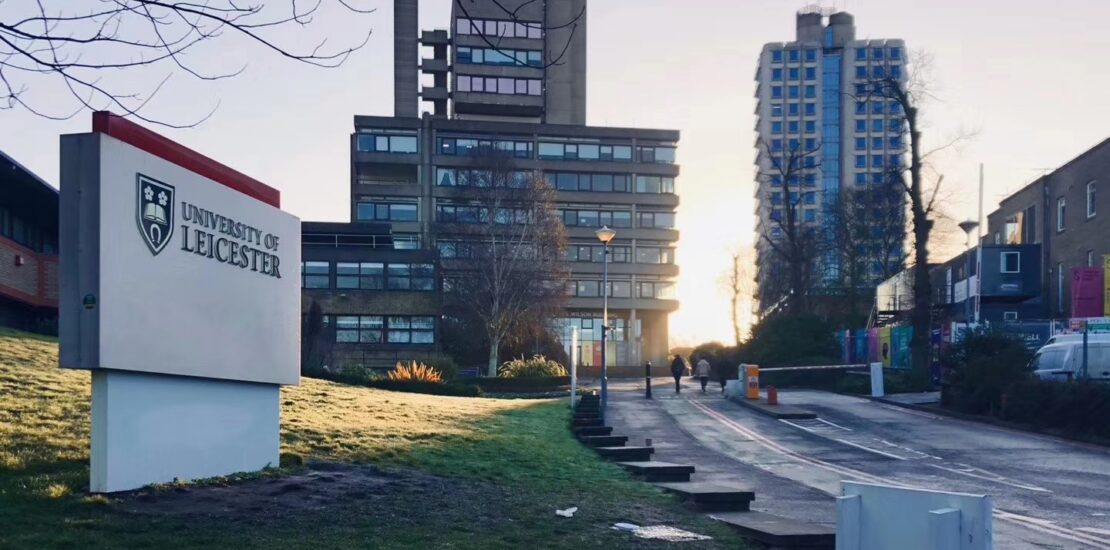Geology imperilled
There is a growing disconnect between the priorities of education and societal need, and those of today’s university management, as epitomised by proposed closures at the University of Leicester, argues Jan Zalasiewicz

The University of Leicester, UK (Credit: WFan, CC BY-SA 4.0
In recent years, universities across many western nations, including several in the UK, have closed Earth science courses and downsized their geology departments. The University of Leicester is the latest institution to fall foul of this trend. Following a strategic review to address financial pressures, the University of Leicester has proposed merging the School of Geography, Geology & the Environment with Chemistry to create a new School of Chemical, Earth and Environmental Sciences. Around half of the existing geology staff are expected to lose their jobs.
Geology provides vital scientific foundation for understanding how Earth’s natural systems behave, especially when they are placed under stress, and provides key knowledge to help address climate and biosphere change and work towards a sustainable future. Those in university management positions seem not to grasp this, as they focus on running our universities as businesses.
Expectations exceeded
The teaching of geology at the University of Leicester goes back more than fifty years. During this time, the university has developed, and maintained, a superb reputation for geoscience teaching and research, punching far above its weight. Generations of students enjoyed the various degree courses in Earth science, in which the teaching of geological fieldwork long took a pride of place, and received an excellent all-round education. For student satisfaction, Leicester’s geology course was long at or near the top of the UK rankings and was ranked first in 2025. That was an exceptional result given the unexpected and hasty evacuation, in the summer before, of the Bennett Building, the home of Geology and Geography for decades, as it was closed for renovation.
the university has developed, and maintained, a superb reputation for geoscience teaching and research
Leicester’s research, too, is groundbreaking: in palaeontology, with the discovery of the ‘Charnian’ (now Ediacaran) fossils in the Precambrian, and key studies elucidating the evolution of life across deep time based on exceptionally preserved fossils; in global tectonics and geophysics (including establishing the UK’s first Geophysics BSc degree), the science of catastrophic volcanic eruptions, mantle dynamics, mineralization processes and, recently, in the big questions of climate change, loss of biodiversity, deforestation impacts, seeking new resources, and leading geological analysis of the Anthropocene concept. This is the kind of work that is needed now more than ever.
Geology misunderstood
Despite the critical importance of geology to our sustainable future, management at the University of Leicester have proposed that from next year some half or more of the geology staff will be made redundant, along with a similar proportion from geography (all human geographers are targeted), chemistry, history and all staff from modern languages and film studies (departments that will be closed). The remaining geologists, geographers and chemists are to be shoehorned into a new school combining these disciplines: most are on teaching-only contracts, and the only researchers to be maintained are those that broadly align with new ‘research themes’ chosen by the university management without consulting the scientists themselves.
In geology, the only remaining areas of research will be critical materials and satellite-based Earth observation: important areas, to be sure, but a ridiculously small span of the geological sciences.
In geology, the only remaining areas of research will be critical materials and satellite-based Earth observation: important areas, to be sure, but a ridiculously small span of the geological sciences. All palaeontologists – key strengths of Leicester geology past and present – are targeted for redundancy. The loss of palaeontology is absurd, not least because of the huge and growing importance of the deep time record in providing analogues for a near-future Earth and its (increasingly difficult and dangerous) conditions of habitability. Leicester’s palaeoclimatologists, who research climate change and biodiversity past, present and future, have essentially been forgotten by the narrow managerial reduction of ‘climate and environmental futures’ to remote sensing and sustainable mining.
Business trumps education
Extraordinarily, the university authorities plan to carry on teaching and advertising a geology degree together with palaeontology, even though their proposals imply it would in effect be taught by a skeleton (and therefore wholly unbalanced) crew of staff. Understandably, the students are distressed and furious, recognising that they would no longer receive the kind of education – informed by real knowledge, expertise and authority across the full range of disciplines – that they signed up for. There are post-graduate students too, who would lack supervisors, and research projects with post-doctoral workers already funded, with no-one to run them.
Why are the cuts to staff and expertise being made? The university’s higher management cite financial difficulties and say these subject areas are not profitable enough, and so drastic measures are needed. A detailed, thoroughly worked proposal from staff in the School of Geography, Geology & the Environment for how earnings could be realistically increased and costs could be cut has been ignored. Positive change in the past two years that tremendously improved the financial position of the school has been ignored by management. And, the protests of the students have also been ignored, going so far as to delete legitimate student comments from university social media posts, presumably on the grounds that this reflects poorly on the institution externally.
The higher management do not, mind, say that these areas are unprofitable – simply that they wish to establish a financial buffer for the future. The real reasons thus may be sought in looking at where the money is going in a modern-day university, because it’s no longer part of a nationally run, higher-education system aimed at providing the range of skills and knowledge needed for the nation (though that aim is formally what underpins a university’s charitable status). Rather, it is what universities have become in the UK, in effect private companies supplying education to clients (formerly known as students), and competing fiercely with each other for business. Investment plans therefore are aimed primarily at increasing market share and profits, not to enhance the quality of education.
So, at Leicester some £500 million has been spent on large – indeed grandiose, if not hubristic – building programmes that include a glossy new student union, refurbishment of the management building, a prestigious Space Park at the edge of the city, as well as the expansion of degrees in China to bid for the foreign market. It seems that image at the levels of management trumps mere education: a few years ago, the university closed the (profitable and popular) university bookshop to clear room for more social space for the students (who were not impressed). Much of the money for these prestige projects is borrowed from banks, insurance funds and investment companies, many in the USA, as reported by Burrell and colleagues (2024). The results in practice seem not to have matched the grand management ambitions. There are now large debts that must be serviced, to the tune of millions of pounds a year. With this financial house of cards now at risk, it is the staff of geology at Leicester (and geography, chemistry, languages, history and film studies) that, management assert, need be sacrificed. There has, of course, been little or no suggestion that the university management team might be trimmed in this belt-tightening exercise.
These staff really cared, and still do, and the students know this
It is a tragedy for the lecturing (and technical, and clerical) staff targeted, with the loss of careers, and mortgages and families to support. To keep the teaching, research and the ever-increasing administrative duties going, they have worked many more hours than they were contractually paid for, year after year, often working far into the night (I know, I was there). Redundancy is poor reward for all this effort. These staff really cared, and still do, and the students know this. The staff in Leicester are on strike in protest at these cuts, but the students are not criticising them for neglecting their teaching duties; indeed, they are turning out day by day on the picket lines and organizing in support of the beleaguered staff.
Lend support
The planned cuts fly in the face of all academic reason. The university is lauding its climate change ambitions: it envisages a new school with the focus on chemistry, the Earth and environment. However, at the same time it is proposing to cull its palaeobiological expertise in the biosphere and climate change, including research personnel at the forefront of international focus on the interdisciplinary Anthropocene. To cast aside the biosphere, past and present, in any school of the environment shows naivety of interdisciplinary understanding at the very least and undercuts the eloquent message of Sir David Attenborough and others, which emphasises how human survival is directly linked to the health of the natural world. With no research expertise left in palaeontology, volcanology, stratigraphy, sedimentology and structural geology, and after ripping the heart out of the skills and expertise that Leicester once possessed, how can management expect geology degrees to still be taught and accredited?
The university higher management – who, focused on financial engineering, have become almost wholly detached from how teaching and research function on the ground – seem at best to be ignorant of this problem, and unaware of the reputational damage that such casting away of international expertise would cause. There are alternative possibilities that should be listened to and are best developed in close meaningful consultation with the academic staff working at the coal face, making everybody part of the solution.
What can we do? In the case of Leicester, if you feel strongly that the once-thriving subject of geology should not be lost there, please do write to the Vice-Chancellor, Professor Nishan Canagarajah. Please also consider signing the petition ‘Save Geology at the University of Leicester’ available at Change.Org. The more voices that can be applied, from as many directions as possible, the better.
More widely, the University of Leicester is only one, if currently extreme, example of how geology is being squeezed out of education, because of ignorance about what geology means and what it can contribute daily at levels of decision-making that have real power and agency. The Geological Society is one organisation that can have a real voice in reaffirming its value, so that geology can thrive in the future – at Leicester and elsewhere.
To sign the petition ‘Save Geology at the University of Leicester’, please visit: www.change.org or use the QR code:

Author
Prof Jan Zalasiewicz
Emeritus Professor at the University of Leicester, UK
Further reading
- Burrell, G. et al. (2024) Shaping for Mediocrity: The Cancellation of Critical Thinking at Our Universities. Zer0 Books. 256 pp.











